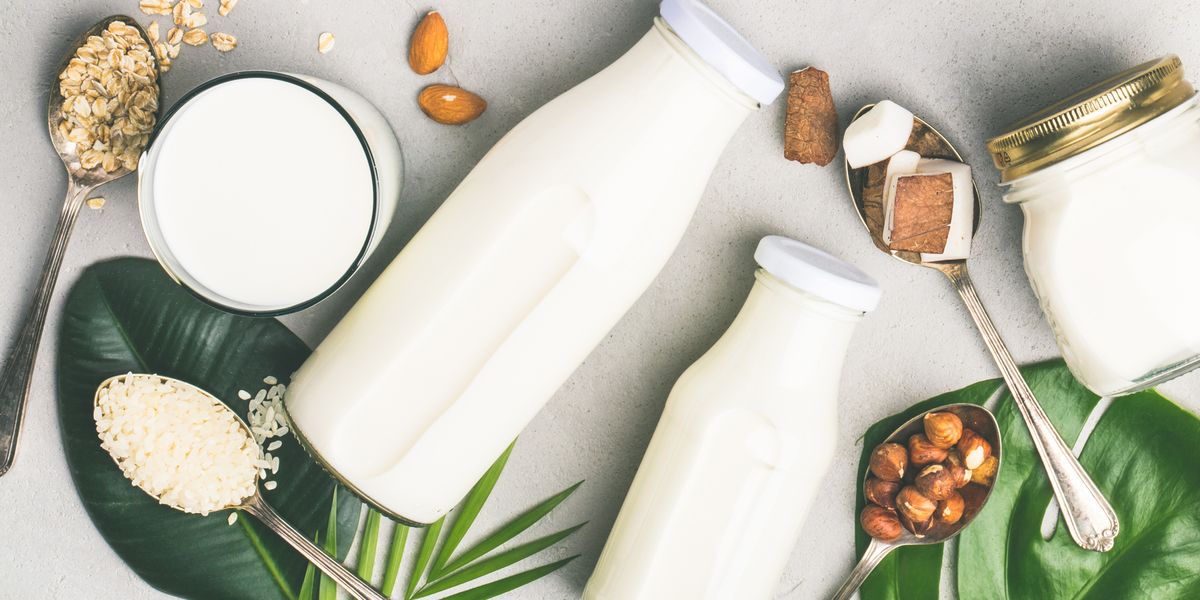Coconut milk - Coconut milk is made out of water and the white flesh of brown coconuts. It has a creamy texture and a sweet coconut flavor. It holds one-third the calories of cow’s milk and has the lowest protein and carbohydrate content of non-dairy milk. This milk is widely used in Indian cooking as we use it for many dishes, like curries or moong dal, and in milkshakes. You can buy coconut milk from the shop or make it at home.
Positive traits
Coconut milk is naturally full of important nutrients like manganese and copper. It can be fortified to be a good source of calcium, vitamin A and vitamin D.Negative traits
It may contain carrageenan which can cause digestive issues in some people. Coconut milk is not a good source of protein and it is a high-calorie food.Almond milk - The creamy thick texture and delicious nutty flavor of almond milk has aided it to become a hugely popular plant-based milk.
Positive traits
Manufactured almond milk is fortified with calcium and vitamin D and has a medium amount of potassium. This is low in calories and sugar, almonds and almond milk itself are high in vitamin E, which is a powerful antioxidant. The taste of almond milk is very pleasant and it can easily replace regular dairy milk for your recipes.Negative traits
It’s not a good source of protein. Almonds contain only a small amount of calcium if not fortified.Oat milk - Oat milk is made out of a mixture of steel-cut or rolled oats that are soaked in water, blended, and strained through a cloth to separate the milk and oats. Oat milk naturally has a slightly sweet taste and is mild in flavor. Oat milk is high in protein and fiber, calories, and carbohydrates.
Positive traits
Vegan, lactose, soy and nut-free. Oat milk has a slightly sweet and mild flavor and can substitute regular milk in coffee drinks, tea, cereal, baking or smoothies. It contains beta-glucans - a soluble fiber that improves heart health.Negative traits
It has a lot of carbohydrates and only a small amount of protein compared to other plant-based options. Most of the calories come from carbohydrates which might increase the sugar level in your blood.Soy milk – It is the most widely available and popular non-dairy drink in India. Soy milk is made out of dried soybeans and water. If you buy it from the shop, it may also contain thickeners to improve its consistency and shelf-life. Soybeans and soy milk are good sources of protein, calcium (when fortified), and magnesium.
Positive traits
It can be fortified with vitamins A, B, C and E and calcium. Has only a very small amount of saturated fat and sugar.Negative traits
Soy is a common allergen, it can cause gastric issues. Soy milk is often made out of genetically modified plants, which you should avoid, so always check the label first before buying.
 Nowadays, plant-based milk alternatives have become very popular and widely accessible. Read on to know some delicious healthier plant-based alternatives especially for people having lactose intolerance
Nowadays, plant-based milk alternatives have become very popular and widely accessible. Read on to know some delicious healthier plant-based alternatives especially for people having lactose intolerance










.jpeg)

.jpg)







.jpeg)



.jpg)


.jpg)




.jpg)


